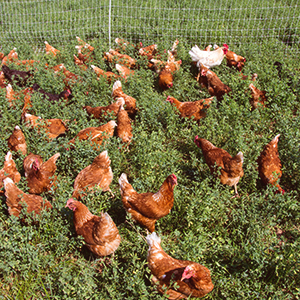Why “Cage-Free” Is Not Exactly What It Sounds

This article was written by Mike Geary, certified nutrition specialist and was originally published on https://thenutritionwatchdog.com/why-cage-free-eggs-are-a-scam-plus-organic-eggs-vs-pasture-raised-vs-grain-fed-eggs/
I’m always amazed how many people overlook the importance of what an animal was fed and how that relates to the nutritional benefits of that food.
Eggs are a perfect example.
As you probably know, our egg supply in the US comes mostly from factory-farmed chickens that not only live in horrendously unhealthy conditions for the chicken, but also fed an unnatural diet of grains that SEVERELY affects the nutritional qualities of the eggs for your health.
I’ve been digging around on this topic for a long time, and here are some interesting things I’ve found:
 In general, the regular eggs you get at the supermarket (that are fed grains and are from factory farms) contain anywhere from 30mg to 80mg omega-3 fatty acids per egg (depending on egg size, variety of hens, exact ratio of feed, etc)
In general, the regular eggs you get at the supermarket (that are fed grains and are from factory farms) contain anywhere from 30mg to 80mg omega-3 fatty acids per egg (depending on egg size, variety of hens, exact ratio of feed, etc)
However, hens allowed to roam freely outdoors on pasture, and/or fed a diverse feed of greens, mixed vegetables, bugs, grubs, worms, etc can contain anywhere from 300mg to 700mg of omega-3’s per egg.
One such study came from a Dr. Simopoulos who analyzed the omega-3 vs omega-6 content of eggs from a farm in Greece where the chickens roamed freely on pasture and ate a variety of natural foods such as greens and bugs/worms. These eggs were compared against analysis of “supermarket eggs” fed a typical grain-based diet in the US.
The eggs from the free roaming chickens in Greece had an omega-6 to omega-3 ratio of 1.3 to 1 while the “supermarket eggs” had a horrendous omega-6/omega3 ratio of 19.4 to 1.
As for total omega-3 content per egg in Simopoulos’ report, the eggs from the free-roaming hens in Greece had approx 300 mg of omega-3’s per egg, while the “supermarket egg” had a lowly 30 mg of omega-3’s per egg. That’s 10x more healthy omega-3s in the pasture-raised eggs, which you know are so incredibly important for your brain health, heart health and lots more!
So the next time you hear somebody say there’s “no difference” between standard grocery store eggs (from factory farms) and the more expensive pasture-raised eggs, show them THOSE stats!
I’ve also been reading the inside of egg cartons at grocery stores lately and comparing notes on their label claims of omega-3 fatty acids.
The egg producers recently have been catching on to the public’s knowledge of the reduced omega-3 content in mass produced eggs… so certain brands have now been “fortifying” the hens diet with feed additions higher in omega-3’s to help balance out the excess omega-6’s found in eggs from grain-fed hens.
Usually, this fortification occurs by adding either flax seed or an algae meal (or fish meal) to the hens feed. The hens eat more omega-3’s and that produces a higher omega-3 content in the eggs.
Some of these so-called “omega-3 eggs” have label claims anywhere from 100mg omega-3’s to 250mg omega-3’s… Definitely better than the 30mg omega-3’s found in the typical “supermarket eggs”. However, pasture-raised eggs would still be healthier overall than grain-fed hens that just contained a supplement in their feed.
I also stumbled onto a specific brand of eggs recently that touted that it’s hens are fed a patented feed mixture of 20 different vegetables, grains, and minerals. Because of the diverse diet that these hens are fed, their measured omega-3 content is listed as 660mg omega-3’s per egg, as well as a perfect 1:1 ratio of omega-6 to omega-3.
This is 22x the omega-3 content of the grain-fed “supermarket egg” that contained only 30mg omega-3’s in Dr. Simopoulos’ report.
 That just shows how powerful of a difference in the nutrition composition that occurs simply by feeding the hens a proper diverse diet. And we haven’t even touched on the nutritional content of vitamins, minerals, carotenoids, etc that will obviously be higher in a healthy hen fed a diverse diet as opposed to a factory farmed hen.
That just shows how powerful of a difference in the nutrition composition that occurs simply by feeding the hens a proper diverse diet. And we haven’t even touched on the nutritional content of vitamins, minerals, carotenoids, etc that will obviously be higher in a healthy hen fed a diverse diet as opposed to a factory farmed hen.
(Btw, this is the same thing that happens in grass-fed beef vs grain-fed beef… there are much higher omega-3 levels in grass-fed beef, and much higher levels of vitamins, minerals and antioxidants)
However, these feed improvements for hens are only a small step in the right direction. Keep in mind that these egg companies with label claims of increased omega-3 content still doesn’t necessarily mean that the hens were raised in an outdoor environment, and allowed to roam freely in the sunshine (which gives them more vitamin D) instead of being confined indoors in filthy conditions their entire lives, sitting in their own excrement, and barely able to move.
Also keep in mind that “cage-free” does NOT mean that the hens actually go outside… According to experts in the field, “cage free” eggs only means that there is a small door somewhere that the hens COULD go outside if they were somehow able to find the small door through a maze of thousands of other hens, and were smart enough to venture through it. This can vary vastly from company to company.
This is supposedly a loophole in the whole “cage-free” labeling system. I’m not sure if there’s any way currently to know IF the chickens actually ventured outside even when they’re labeled “cage-free”.
So what are the best options for the healthiest eggs?
1. By FAR the best option is if you can find pasture-raised eggs, such as a farm like Vital Farms. This is one brand of eggs I find at my local health foods store, or at Whole Foods. If the eggs are labeled “pasture-raised”, those are guaranteed to be the healthiest eggs you can buy, and the hens that are treated the best.
Also, if you can find a local farmer (or farmers market) where you KNOW that the hens are actually outdoors most of the time and allowed to eat a natural diet with high variety, that is great too. These will be the superstar eggs in terms of nutritional quality.
2. If you absolutely don’t see any pasture-raised eggs at your grocery store, and don’t know any local farmers, the next best options are organic eggs and/or “omega-3” eggs. In these scenarios, we at least know that the hens ate an organic diet and/or had supplemental flax or other omega-3 rich ingredients added to their feed.
You can also read the labels on egg cartons and see if it sounds like the hens were fed a highly variable diet (instead of just grains). Sometimes this can come from algae meal or flax seed, etc added to their diet. This is at least an improvement over standard supermarket eggs.
Despite what you may hear from some so-called “health experts” who say that all eggs are equal, these types of eggs WILL have significant nutritional benefits compared to your typical supermarket eggs.
Remember that “cage-free” has almost no meaning, because in most cases, it’s just a tiny door that’s open and the majority of the hens will never find their way to that open door, so they never actually get to go outside in the fresh air and sunshine. You want to look for pasture-raised eggs as the top priority, and if you can’t find those, opt for organic or omega-3 eggs as the next best alternatives.
Remember to think of price differently than most people… sure, I realize that pasture-raised eggs might be $5 or $6 per dozen instead of $3, but that’s still super cheap compared to most foods. It’s still only 40-50 cents per egg (and maybe 15 cents more than a standard grain-fed egg), and eggs are one of the most nutrient dense foods on the planet that you can eat for your health, so it’s worth it to spend a little more on that upgrade.
Plus, you’re investing in your health with better quality foods, which can save on health care costs later!
And lastly, if you’re still not up to date about why the saturated fat and cholesterol from egg yolks is actually GOOD for you, then make sure to read this article of mine, which as you can see, has 57,000 facebook likes/shares… Why whole eggs are a LOT healthier than egg whites.
